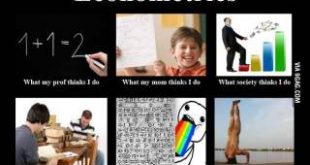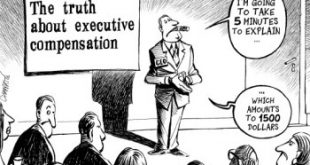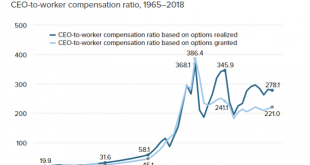from Lars Syll There seems to be a pervasive human aversion to uncertainty, and one way to reduce feelings of uncertainty is to invest faith in deduction as a sufficient guide to truth. Unfortunately, such faith is as logically unjustified as any religious creed, since a deduction produces certainty about the real world only when its assumptions about the real world are certain … Unfortunately, assumption uncertainty reduces the status of deductions and statistical computations to...
Read More »The U.S. economy is not the world’s largest
from Dean Baker I know that reality often has little place in our political debates, but is there any way we can the New York Times and other news outlets to stop saying that the U.S. economy is the world’s largest? It happens not to be true. According to the I.M.F., using purchasing power parity measures, which most economists view as the best measure, China passed the United States in 2015 and is now more than 25 percent larger. Maybe reporters and editors get a kick out of saying that...
Read More »Dean Baker Live Stream
Support the stream: https://streamlabs.com/deanbaker1
Read More »Marginal productivity theory — a dangerous thought virus
from Lars Syll The marginal productivity theory of income distribution was born a little over a century ago. Its principle creator, John Bates Clark, was explicit that his theory was about ideology and not science. Clark wanted show that in capitalist societies, everyone got what they produced, and hence all was fair: “It is the purpose of this work to show that the distribution of the income of society is controlled by a natural law, and that this law, if it worked without friction,...
Read More »China did not trick the US — Trade negotiators served corporate interests
from Dean Baker The New York Times ran an article last week with a headline saying that the 2020 Democratic presidential contenders faced a serious problem: “how to be tougher on trade than Trump.” Serious readers might have struggled with the idea of getting “tough on trade.” After all, trade is a tool, like a screwdriver. Is it possible to get tough on a screwdriver? While the Times’s headline may be especially egregious, it is characteristic of trade coverage which takes an almost...
Read More »Wren-Lewis trying to cope with ideology
from Lars Syll Simon Wren-Lewis has also commented on the study by Mohsen Javdani and Ha-Joon Chang — on economics and ideology — that I wrote about earlier today. Says Wren-Lewis: I also, from my own experience, want to suggest that in their formal discourse (seminars, refereeing etc) academic economists normally pretend that this ideological bias does not exist. I cannot recall anyone in any seminar saying something like ‘you only assume that because of your ideology/politics’. This has...
Read More »Who is to blame for Argentina’s economic crisis?
from Mark Weisbrot Argentines remember the role the IMF played in the last depression. They also remember the improvement in their lives under Kirchnerism. What are we to make of Argentina’s surprise election results on August 11, which jolted pollsters and analysts alike, and roiled the country’s financial markets? In the presidential primary for the country’s October election, the opposition ticket of Alberto Fernández trounced President Mauricio Macri by an unexpected margin of 15.6...
Read More »Coming apart
from David Ruccio American capitalism is coming apart at the seams. Truth be told, it’s been coming apart for decades now—and that trend has only continued during the recovery from the worst crash since the 1930s. A good indicator of the shredding of the U.S. economic and social fabric is the difference in the level of compensation of Chief Executive Officers of major American corporations compared to that of the average worker. While they labor, workers create value, some of which...
Read More » Real-World Economics Review
Real-World Economics Review







